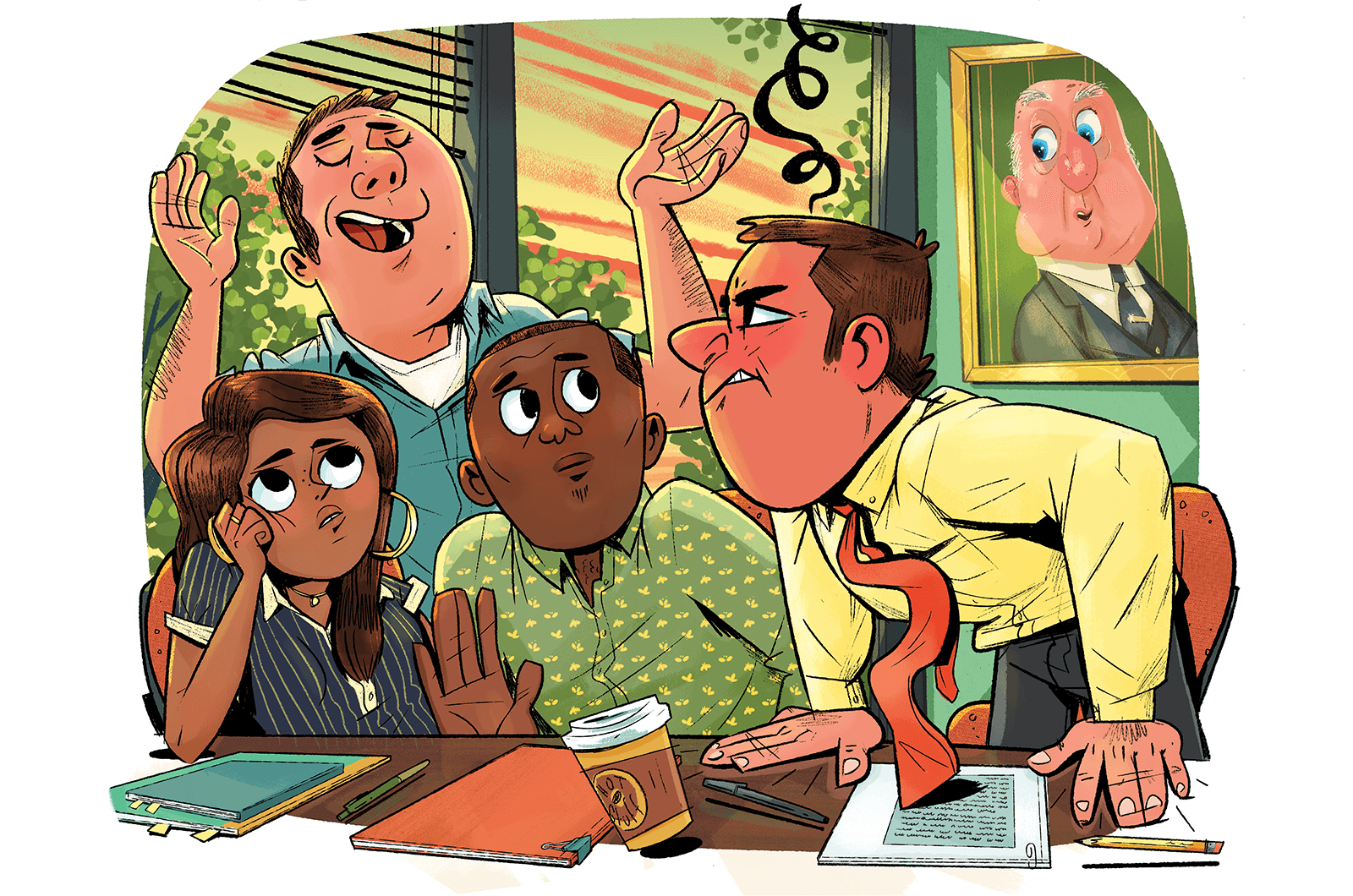
Wouldn’t it be wonderful if we could feel deeply connected to and get along with every person in our lives? Sure it would … and I also want a unicorn.
Some people will always rub you the wrong way. You’re stuck in the office with them. They’re in your club meetings. You sit next to them at an event. You painfully chat with them on the sidelines of your child’s soccer practice.
Having a game plan for how to deal with annoying people will save you from unnecessary emotional turmoil—and you might find yourself actually enjoying an interaction with someone you never thought you’d like.
Consider what you can— and can’t—change.
Start by examining what you have control over and what you don’t. Remember: Other people’s thoughts and actions are not within your control.
Instead of focusing on what’s out of your control, set up scenarios that guide someone to do, say, or even think what you would like them to. That’s the essence of influence: manipulating what you do have control over in hopes of influencing someone else. So, to not be annoyed by annoying people, you must go straight to what you have control over—namely, yourself. You can control your state of mind, your reactions, your intentions, your approach, and your choice of words.
Think about a person who annoys you. Really conjure a clear picture. See the person’s smug face. Hear their cringe- inducing voice. Now, notice. How do you feel? What expressions surface on your face? When you think about this person, does your nose crinkle? Does your body give an involuntary shudder? Do you feel a surge of contempt? This is the place to start controlling your reactions.
In his extensive studies on marriage and relationships, American psychologist John Gottman was able to predict with over 94% accuracy whether or not a couple would last. His most effective measurement? Contempt. If he sees signs of contempt in one or both partners, it’s a good indicator they will be facing each other in court one day.
Judgment closes the door to change. Curiosity opens it.
But contempt can exist in any relationship. That’s why it’s important to stop this feeling before it festers.
When you feel yourself rolling your eyes or raising your eyebrows, ask yourself:
- What is my first reaction when I see or talk to this person?
- What thoughts (or judgments) automatically come to mind?
- What physical reactions do I experience (tension, change in breath, shift in posture, change in vocal tone or cadence)?
- Are any not-so-hidden sighs of annoyance slipping through my lips?
This is what you’re putting into the relationship. You’re responsible for your side of the relationship.
Pay attention to your physical response.
In general, when you don’t get along with someone, you get a spike in cortisol or adrenaline. Your muscles tense up—you’ll feel a tightness in your chest, maybe your shoulders lift toward your ears, or you might just hold your pen a little tighter in your hand. Perhaps your brow furrows or you tilt your head down while your eyes look up at the annoying person (a primitive body language posture that signals bubbling aggression).
Your disapproval toward that person can be heard as well as seen. You might talk painstakingly slower or agitatedly faster.
Not only does the annoying offender pick up on these cloaked signals, but these physical reactions also amplify your internal negative emotions. Now you’re in a feedback loop of annoyance.
The real danger is when your reactions become automatic and you’re not aware of them. Mitigate your annoyance level by consciously taking control of your reactions. Focus on relaxing the tension in your body. Breathe at a comfortable (not annoyed) pace.
Your goal is to adapt a neutral position—physically, emotionally, and mentally—so that you can use a different approach with people who annoy you.
Tune in to your thoughts.
Next, do a thought audit. Consider if you have created certain beliefs about this person. Some examples could include:
- She never listens.
- He always seeks attention.
- He is so egocentric.
- She doesn’t follow through on anything.
Once you have awareness of those thoughts, question them. Are they true?
You can quickly identify false beliefs whenever you use the words always or never. It’s unlikely that one person could always do anything or never do another. You can find circumstances in which they have done the opposite of your always/never belief. Try changing your (judgmental) beliefs by swapping out the words always/never for sometimes.
Exercise your brain and find a different perspective.
Now that you’ve captured your automatic thoughts playing on a loop, it’s time to find a more helpful thought to replace it. Is there an alternate truth you could use instead?
I’m not talking about lying to yourself or pretending everything is fantastic but rather remembering that human beings are complex, layered creatures, and no one can be defined in black-and-white terms. We only see a fraction of what other people experience.
Keep questioning your assumptions so you can operate from compassion and make stronger connections. Is there a nuance you can add to your thoughts and beliefs about this person that would enhance your relationship with them, rather than build more barriers between you?
Other people’s thoughts and actions are not within your control.
For example, a client of mine dislikes his boss. He feels like his boss is always seeking approval from everyone. (Did you catch that “always”?) And because his boss wants approval more than anything else, his boss doesn’t like to ruffle any feathers and, therefore, lets other employees get away with bad behavior.
I asked my client, “How would your boss describe himself? He likely would not say ‘I always seek everyone’s approval.’ So, how would he say it?”
After thinking about it a bit, my client said, “Well, he’d probably say that he just wants everyone to be happy.”
“Yes!” I said. “And now imagine how difficult his job is every day. He’s the boss. And there’s no way to be the boss and keep everyone happy all the time. You have to disappoint people, which sounds like his biggest fear. Every day presents him with a challenge—a chance for him to be disliked. And you (my client) also seem like the type of person who isn’t easily impressed. So, maybe now we can see where the clash is occurring.”
My client paused as he considered this, then exclaimed, “That’s SO BIG! I never thought of it that way!”
After shifting the belief from “he always seeks everyone’s approval” to “he’s really afraid of letting people down,” we figured out ways we could repair and improve their working relationship.
I coached my client to sandwich his criticisms and differing opinions between validating statements, such as, “I like where we’re headed with this. We could improve the process if we integrated this other system,” or “I think you’ve laid out a great framework for us to work with here.”
By questioning a faulty belief, we were able to find things within his control that could improve the relationship.
Shift to curiosity.
The next time you find yourself tensing your muscles or furrowing your brows, shift your mindset to one of curiosity rather than judgment. In doing so, you change the dynamic in the relationship because judgment closes the door to change. Curiosity opens it.
Editor's Note: A version of this article first appeared on the author's blog.
Sharí Alexander
is a speaker, writer, trainer, and coach, specializing in influencing techniques. She is certified in neurolinguistic programming, micro expressions, and body language, and has designed numerous communication training courses.



 Previous
Previous
 Previous Article
Previous Article

